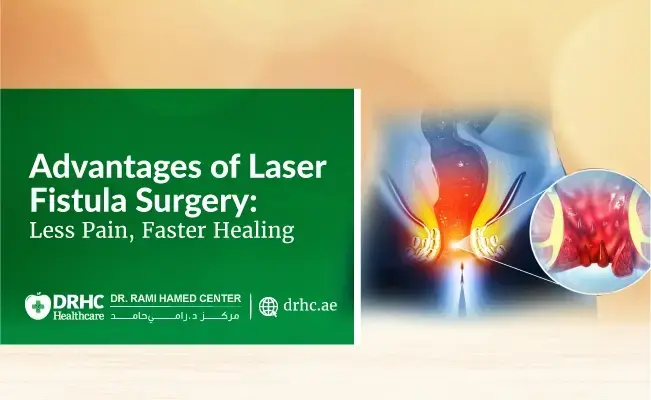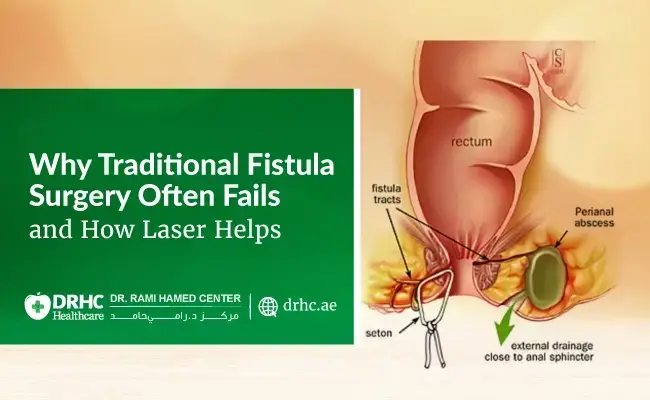.webp?width=650&height=400&name=DRHC%20BLOG%20Creatives-167%20(1).webp)
Hemorrhoids are more common than most people realize—and yet, they’re also one of the least talked-about medical issues. If you’re experiencing discomfort, itching, or bleeding during bowel movements, you may be dealing with hemorrhoids. The good news? Relief is possible, and treatment doesn’t always involve surgery.
At the Dr. Rami Hamed Center (DRHC) in Dubai, we frequently help patients manage and treat hemorrhoids with compassion and care. In this blog, we’ll explain the key differences between internal and external hemorrhoids, how to recognize them, and what treatment options are available—whether you're seeking home remedies or specialized care.
What Are Hemorrhoids?
Hemorrhoids are swollen veins in the lower rectum or around the anus, similar to varicose veins. They can develop internally (inside the rectum) or externally (under the skin around the anus). While not usually dangerous, they can cause significant discomfort and affect your quality of life if left untreated.
Internal vs. External Hemorrhoids: What’s the Difference?
Understanding the type of hemorrhoid you have can help you get the right treatment.
Internal Hemorrhoids
- Location: Inside the rectum, not visible from the outside.
- Symptoms:
- Painless rectal bleeding (bright red blood on toilet paper or in the toilet)
- Mucus discharge
- A feeling of fullness or pressure
- Prolapsed hemorrhoid (when it bulges outside the anus during straining)
- Pain level: Typically painless unless prolapsed or irritated.
External Hemorrhoids
- Location: Under the skin around the anus, often visible.
- Symptoms:
- Pain or discomfort, especially when sitting or passing stools
- Itching or irritation
- Swelling or a hard lump near the anus (can be a thrombosed hemorrhoid if a clot forms)
- Pain level: Often more painful due to the sensitive skin in this area.
Our Related Blogs:
- Hernia Repair Success Rates: What Affects Long-Term Outcomes?
- Is Mesh Always Needed in Hernia Repair? Pros, Cons, and Alternatives
- 10 General Surgery Myths Debunked by a Dubai Surgeon
- Gallbladder Removal in Dubai: Laparoscopic vs. Open Surgery – Which is Safer?
- Life After Gallbladder Surgery: Diet, Digestion & Long-Term Effects
- Your Top Gallbladder Surgery Questions—Answered
- Can Appendicitis Recur After Surgery? (Spoiler: No!)
- Laparoscopic Appendectomy: Recovery Timeline & Scar Care
Common Questions and Concerns
Is bleeding always a sign of hemorrhoids?
While hemorrhoids are a common cause of rectal bleeding, it’s important to rule out other conditions such as anal fissures, polyps, or even colorectal cancer. If you notice bleeding, don’t ignore it—schedule an evaluation at DRHC Dubai for an accurate diagnosis.
Do hemorrhoids always require surgery?
Not at all. Many cases of hemorrhoids, especially in the early stages, can be managed with lifestyle changes, dietary adjustments, medications, or minimally invasive procedures. Surgery is typically reserved for severe or persistent cases that don’t respond to other treatments.
Will they go away on their own?
Mild hemorrhoids can improve with home care and healthy habits, but chronic or severe hemorrhoids may persist or worsen without proper treatment.
Best Treatment Options Available
At DRHC Dubai, we tailor treatment based on the type, severity, and impact on your daily life.
Home Remedies and Lifestyle Changes
- Dietary fiber: Eating more fiber (fruits, vegetables, whole grains) softens stools and reduces straining.
- Hydration: Drinking plenty of water helps prevent constipation.
- Warm sitz baths: Soaking in warm water can soothe irritation and promote healing.
- Topical treatments: Over-the-counter creams or suppositories may ease pain and swelling.
Non-Surgical Procedures
These are typically outpatient procedures performed with little to no downtime:
- Rubber band ligation: A small band is placed around an internal hemorrhoid to cut off its blood supply.
- Sclerotherapy: A solution is injected to shrink the hemorrhoid.
- Infrared coagulation (IRC): Heat is used to seal the hemorrhoid’s blood vessels.
Surgical Treatment
When less invasive options don’t provide relief, surgery may be recommended:
- Hemorrhoidectomy: Complete removal of large or severe hemorrhoids.
- Stapled hemorrhoidopexy: For prolapsed internal hemorrhoids, this method uses a stapling device to reposition and reduce blood flow to the affected area.
At DRHC Dubai, our colorectal specialists offer advanced techniques with a focus on patient comfort and minimal recovery time.
When to Seek Medical Help
If you experience:
- Persistent or severe pain
- Ongoing rectal bleeding
- A hard lump near your anus
- Symptoms that interfere with your daily activities
… it’s time to see a healthcare provider. Early treatment can prevent complications and help you return to normal life quickly.
Conclusion: You're Not Alone—We’re Here to Help
Hemorrhoids may be uncomfortable to talk about, but they’re nothing to be ashamed of—and certainly not something you have to suffer through in silence. With the right care, you can get relief and avoid complications.
At Dr. Rami Hamed Center in Dubai, our specialists provide discreet, compassionate, and effective care for both internal and external hemorrhoids. Whether you need a diagnosis, non-invasive treatment, or expert surgical care, we’re here to guide you every step of the way.
Book a consultation today to discuss your symptoms and start feeling better—because your comfort and health matter.
📞 Call Us: +97142798200
📍 Visit Us: Dr Rami Hamed Center, Dubai HealthcareCity
🌐 Website: www.drhc.ae
Topic: Proctology General Surgery




.webp)


.webp)

Leave a comment